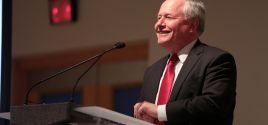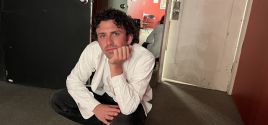I spy: Cameras pop up all over countyBy Andria SimmonsGwinnett Daily Post May. 07, 2006 |
Popular 
Bill Kristol: My Fellow White Americans Are 'The Enemy'

Biden's Lebanon Envoy, Ex-Israeli Soldier Amos Hochstein, Gave Israel 'Green Light' to Invade Lebanon

Israel Detains American Journalist for Reporting on Damage from Iran's Strikes [UPDATE]

Journalist Jeremy Loffredo Released After Four Days in Israeli Detention, Ordered Not to Leave

WATCH: New Film 'Atrocity Inc' Exposes How Israel Lied About October 7th to Justify Genocide
 DULUTH — It seems everywhere you look, the unflinching eye of a camera is staring back at you. To some, the increased use of surveillance video technology by governments, businesses and even Average Joes brings peace of mind. Crooks, bandits and red-light violators can be tracked down and prosecuted. Homes, workplaces and property may be safer from sticky-fingered thieves. But critics are alarmed at the emergence of a Big Brother society, and others say the proliferation of cameras just plain gives them the creeps. For proof that surveillance is spreading, Gwinnett residents need look no further than their own backyard. Red-light cameras began popping up at busy intersections last year, with Suwanee becoming the fifth government in Gwinnett to use red-light technology in March. Gwinnett Clean and Beautiful is planning to purchase three motion-detector cameras to be placed in graffiti-plagued areas. Officials say the low-resolution cameras may not produce a clear enough image to help prosecute taggers, but they could be a crime deterrent. Duluth police are piloting a program to mount cameras on the stop arms of two selected school buses with routes in the city to catch drivers passing school buses. If successful, the program could be expanded to the entire fleet Gwinnett County Public School buses. Georgia Department of Transportation has cameras keeping an eagle-eye on I-85, I-20 and other busy thoroughfares to monitor traffic congestion. Motorists can access footage by logging on to the Georgia NaviGAtor Web site, www.georgia-navigator.com, to find out which roads are clogged with traffic and plan alternate routes. All Gwinnett County public high schools have security cameras in covering commons areas, restroom entrances, building entrance points and campus access points, said Gwinnett County Public Schools spokesperson Sloan Roach. Even in Atlanta’s popular entertainment district of Buckhead, an elaborate camera system has been installed to cover about 95 percent of the area thanks to financing from a group of local property owners bent on deterring crime. So when do public safety concerns trump privacy rights? And will we all be under surveillance 24/7 one day? Watching and waiting A January 2003 report by the American Civil Liberties Union titled “Bigger Monster, Weaker Chains: The Growth of an American Surveillance Society” concludes that privacy, while not yet dead, is on life support. Distributors of electronic surveillance equipment disagree, though, and say privacy and security can co-exist. There is no definitive solution from the courts as when surveillance constitutes an invasion of privacy, said John Neiman, an assistant professor of law at the University of Georgia specializing in torts. In America, legislation has been slow to address the issue and there are no sweeping criminal laws in place. A civil lawsuit is the sole recourse for those who feel their privacy rights have been trampled on. “The courts lean toward saying as long as the camera is in a public place, a person doesn’t have a reasonable expectation of privacy and thus can’t claim that a picture taken of them in a public place is an invasion of their right to be free from an unreasonable search under the Fourth Amendment of the U.S. Constitution,” Neiman said. The main concern for some civil rights groups like the ACLU is that the danger stems not from a single source such as government or commercial business. For now, our privacy is protected because these growing piles of personal information remain scattered across different databases. But if one government-controlled umbrella agency began assembling that data, America could become a police state. People are used to being on camera at retail stores or gas stations. That sort of technology has been in place since closed-circuit television became popular in the 1980s, said Dave Smith, vice president of marketing for Pelco, the world’s leading producer of video security systems. But over the past seven years with the threat of global and domestic terrorism looming, local, state and federal governments have begun using video security systems to monitor public streets, buildings and roadways. The bulk of the demand for surveillance equipment still comes mainly from commercial/industrial markets, but government now accounts for about a third of the market for surveillance systems, Smith said. “It’s probably 70 percent industrial and 30 percent government is a wild guess,” Smith said. “In terms of consumer use it’s almost nonexistent, 1 or 2 percent at most.” Most people living in a city can expect to be recorded up to 10 times a day when they venture outside their door by cameras in convenience stores, ATMs, street corners and highways, Smith said. Suburban dwellers are probably on film less often, from three to five times per day, he said. “You’re recorded a lot. And you’ll be getting recorded more and more and more, so if you’re a bad guy you really should be concerned,” Smith said. In England and Taiwan, laws have been enacted to protect privacy and limit how surveillance technology can be used. Manufacturers in the United States, however, can only recommend that businesses and governments using surveillance equipment abide by certain guidelines. Cameras used by police for enforcing red-light violations and monitoring busy intersections have to be given a green light by the Georgia Legislature. Recently, state lawmakers shot down a request to place cameras outside of Gwinnett County Public Schools to catch speeders because they believed it was an invasion of privacy, said Cpl. Darren Moloney, spokesman for Gwinnett County Police Department. Manufacturers and distributors say there are a few rules of thumb about using video security that should be followed by every company or government agency. “If you’re recording something, you should protect the recording from copying and dissemination,” Smith said. “You should not use it for anything other than what the stated purpose is, and you should force people to state what they are making a recording for and adhere to it.” The concept of using surveillance to catch people breaking the law is a departure from the days when police conducted surveillance only when there was evidence of wrongdoing. At one time, cameras were mainly used as a forensic tool to piece together what happened after a crime had been committed. Now the camera is like an extra set of eyes and ears, or an extra police officer stationed on every corner. One person monitoring dozens of cameras can dispatch police officers to handle crimes while they are in progress. Such is the case in London, where there is the highest concentration of cameras of any major city in the world. Neiman said the use of cameras as a law enforcement tool is an issue that lacks substantial legal precedent in the United States. “The reason why law enforcement traditionally has pursued criminals after they commit the crime is there wasn’t technology that allowed them to detect crimes as they were occurring,” Neiman said. “The challenge courts are facing now is, given we have this technology and given that technology is new and is a change, does that somehow make the use of that technology unreasonable? It would be an analysis based on the totality of the circumstances.” Cameras do help law enforcement in prosecuting offenders — after all, it’s hard to argue with a picture — but they will never take the place of police officers, said Gwinnett County Police Department spokesman Cpl. Darren Moloney. The use of cameras by Gwinnett police is constantly being evaluated to make sure they are being implemented correctly, he added. “They do not take the place of police officers. With a seemingly infinite number of people coming to reside in Gwinnett County and a finite number of police officers, these tools are important,” Moloney said. “However, under this current administration, these cameras will never supercede or take the place of police officers.” The installation of security cameras simply to watch and wait for crimes to happen has riled groups like the ACLU. They think that mind-set “would seek to protect us by monitoring everyone for signs of wrongdoing — in short, by instituting a giant dragnet capable of sifting through the personal lives of Americans in search of ‘suspicious’ patterns,” the 2003 ACLU report warns. “The potential for abuse of such a system is staggering,” according to the report. Just how much surveillance will play a role in securing our future society remains to be seen, but one thing is for certain. The controversy shows no signs of dying down. |



